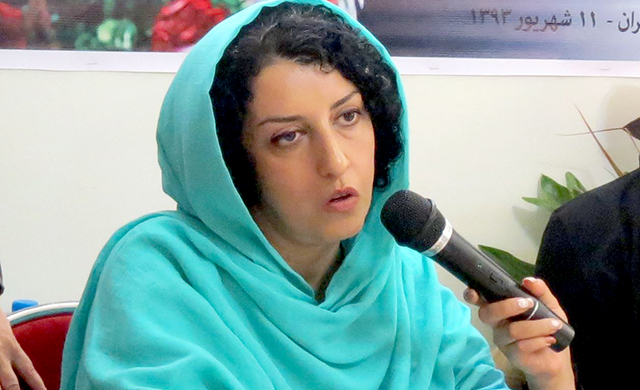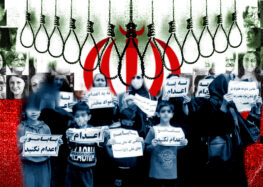Imprisoned Human Rights Defender Narges Mohammadi on Hunger Strike to Maintain Contact with her Children
 In a desperate bid to gain permission to speak to her children on the phone, the prominent human rights activist Narges Mohammadi started a wet hunger strike on June 27, 2016.
In a desperate bid to gain permission to speak to her children on the phone, the prominent human rights activist Narges Mohammadi started a wet hunger strike on June 27, 2016.
“I am asking for nothing other than being allowed to talk to my children on the phone. If this demand is too great, irrational, immoral, unlawful, or against national security, please let me know,” said Mohammadi in an open letter. “Convince me, please. Clarify why a mother, declared a criminal by the state, must be denied hearing the voices of her children.”
“Unlike other prisons in the country, the Women’s Ward in Evin Prison does not have a phone and inmates cannot contact their families. It’s prohibited,” she added. “Visitation is permitted once a week, but after that inmates have to wait for a whole week without any news.”
“While other mothers here are visited by their children, I imagine meeting my dear Kiana and Ali [who live in France] and smelling their small hands and kissing their lovely faces,” she said.
Political prisoners held in the Women’s Ward at Evin Prison are routinely denied proper medical care and hospitalization, face restricted or denied visitation rights even with their young children, are deprived of regular telephone contact with their families, and are not provided adequate nutrition, a recent report by the International Campaign for Human Rights in Iran has revealed.
In an interview with the Campaign, Mohammadi’s husband Taghi Rahmani questioned how phone calls between a mother and her children could be considered a “security threat” by the authorities.
“This ban can only mean one thing: they want to irritate her,” he said. “Narges is sick and she has to take 15 pills [every day] to control her illnesses. If something happens to her [during the hunger strike], the Judiciary and the Intelligence Ministry are responsible.”
Rahmani, who currently lives in France with the couple’s son Ali and daughter Kiana, said his wife had been allowed to speak to her children on the phone only once since her arrest on May 5, 2015 for “a few minutes” on April 2, 2016.
“Speaking to family members is the natural right of every prisoner, but Narges has been denied this for some unknown reason,” he said. “The fact that the kids are with me in France is extra hard for Narges because she can’t see them. The phone is the only available means of contact.”
“Narges was forced to go on hunger strike so that maybe they would let her contact her children,” he added. “Previously, Narges wrote two open letters and spoke to the prosecutor’s representative at [Evin] Prison, but the letters had no effect.”
“The officials never give a clear answer when you ask them why they won’t allow telephone contact,” he said. “I really can’t understand what the head of the Judiciary or the Tehran prosecutor and other officials are thinking. What do you call this behavior, this cruelty?”
Mohammadi, winner of the 2011 Per Anger Prize for her human rights activism, was sentenced in May 2016 during a closed-door trial to serve ten years of a 16-year prison term for “membership in the [now banned] Step by Step to Stop the Death Penalty,” and for “assembly and collusion against national security” and “propaganda against the state.”
The Campaign has called on the Islamic Republic to immediately release Mohammadi.






